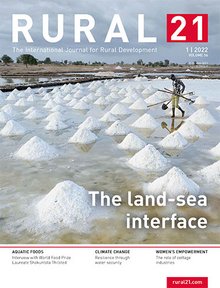Vol. 56 No. 1/2022: The land-sea interface
The land-sea interface

The increase in anthropogenic activities at the interface between land and sea – such as deep-sea fishing and intensive aquaculture, coastal sand mining and land reclamation for housing, shipping and marine plastic pollution – is having a severe impact on coastal ecosystems and their services. Destroyed beaches, dunes and sandbanks, coastal erosion and dying coral reefs are just a few of the consequences. Such damage also affects the livelihoods of coastal communities, which often depend on fisheries or tourism and which are already especially hard-hit by the effects of climate change. It is all the more important to find governance structures that consider the interdependencies between land and sea and allow proper management of possible externalities.
In this issue, in addition to these developments, we present initiatives and programmes which are committed to protecting sensitive coastal areas. They centre in particular on nature-based solutions – which are inspired and supported by nature while simultaneously providing environmental, social and economic benefits. One of the most effective solutions among these is the preservation, rehabilitation and restoration of mangrove forests. Here, our authors show the role the private sector and civil society – and consumers – assume, alongside that of governance and research. For anyone seeking to tackle interconnected problems won’t get far without multi-stakeholder action.
Click here if you are interested to subscribe
Download edition 2022/01 Focus: "The land-sea interface" as PDF
Focus
- Governing land-sea interactions
- Sucking away the sand
- Land reclamation for housing – the example of Côte d’Ivoire
- Down the river and into the sea – plastic pollution and its consequences
- Fighting for coastlines devoured by climate change in Tunisia
- Managing coastal biodiversity and sustaining livelihoods in a complex setting – the Gulf of Mottama Project in Myanmar
- Mangrove forests – a nature-based solution for climate change mitigation and adaptation
- Conserving mangrove ecosystems, securing livelihoods – the seafood sector can play its part
- A multi-stakeholder partnership for integrated mangrove aquaculture in the Sundarbans
- Evidence-based regulation for sustainable development – coastal protection in Ghana



